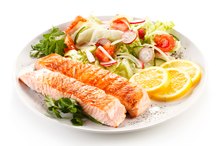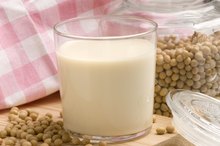Meat Diet for Testosterone
Many people associate testosterone with sex, aggression and masculinity, but it also has been linked to numerous vital body functions that are essential for overall health and development. Furthermore, raised testosterone levels may prevent disease and improve your lifestyle -- both of which may be achieved through eating a diet rich in meat. However, it is crucial that you maintain a degree of caution because excessive meat consumption does pose some risks.
Function
Eating meat, which is high in protein, helps build muscle and stimulates the secretion of the hormone glucagon, both of which contribute to raising testosterone levels. Testosterone, apart from facilitating an array of health benefits, is primarily responsible for sperm production and sex drive, as well as the growth of pubic and facial hair, bone and muscle mass. In men, it is produced by the testes, and in women it is secreted by the ovaries and adrenal glands.
Significance
Carbohydrates & Testosterone
Learn More
According to Dr. Shafiq Qaadri, author of “The Testosterone Factor,” testosterone promotes a multitude of health benefits, including increased energy and vitality, as well as the prevention of high blood pressure, diabetes, heart attacks, obesity and weakening bones and muscles. “In fact,” Qaadri says, "testosterone has lifelong positive effects on your physique, emotions, intellect, relationships, behavior and sexuality.” Although hormone replacement therapy is a viable option if you experience reduced testosterone levels, there are, according to Qaadri, natural ways to boost your levels of the male hormone, including consuming a diet rich in meat.
Solution
To improve testosterone levels through meat consumption, choose meats that are high in protein. Chicken breast, at approximately 10g per ounce, offers high protein content, while pork chop averages 22g of protein. Beef and fish weigh in at an average of 7 and 6.5g per ounce respectively, meaning an average steak or fillet contains between 22 and 25g of protein.
Considerations
Isometric Diet
Learn More
While eating a high-meat diet may raise your testosterone levels, researchers have found that excessive protein intake, especially when coupled with reduced carbohydrate consumption, may in fact lower testosterone levels. In a study presented by the journal “Life Sciences,” seven men consumed a high-protein diet, and then a diet high in carbohydrates, each over the course of 10 days. Although both diets were equal in calories and fat, the high protein diet led to a considerable drop in testosterone levels, while the high carbohydrate diet stimulated a significant increase in testosterone secretion.
Warning
In addition to potentially lowering your testosterone levels, excessive meat consumption poses direct dangers to your health. According to the U.S. National Library of Medicine, consuming too much protein places stress on your kidneys, and it may lead to gout, as well as heightened cholesterol levels. Furthermore, a review published by the “International Journal of Sport Nutrition and Exercise Metabolism” says that a diet constituting more than 35 protein may lead to diarrhea, nausea, hyperinsulinemia, hyperammonemia or hyperaminoacidemia.
Related Articles
References
- “The Testosterone Factor: A Practical Guide to Improving Vitality and Virility, Naturally”; Shafiq Qaadri, MD; 2006
- Life Sciences: Diet-hormone Interactions: Protein/Carbohydrate Ratio Alters Reciprocally the Plasma Levels of Testosterone and Cortisol and Their Respective Binding Globulins in Man
- Medline Plus: Protein in Diet
- International Journal of Sport Nutrition and Exercise Metabolism: A Review of Issues of Dietary Protein Intake in Humans
- University of Rochester Medical Center. Total testosterone. 2019.
- MedlinePlus. Testosterone injection. Updated March 15, 2019.
- MedlinePlus. Testosterone levels test. Reviewed June 27, 2018.
- Long N, Nguyen L, Stevermer J. PURLS: It's time to reconsider early-morning testosterone tests. J Fam Pract. 2015;64(7):418-9.
- Kaiser Permanente. Testosterone results. Updated November 6, 2018.
- American Society for Reproductive Medicine. Testosterone use and male fertility. 2015.
- Harvard Health Publishing. Testosterone - what it does and doesn't do. Updated August 29, 2019.
- Franks S, Hardy K. Androgen action in the ovary. Front Endocrinol (Lausanne). 2018;9:452. doi:10.3389/fendo.2018.00452
- Test ID: TGRP; Testosterone, Total and Free, Serum. MayoClinic Medical Laboratories.
- Testosterone: Drug information. Lexicomp, Inc. UptoDate.com.
- Camacho EM, Huhtaniemi IT, O'Neill TW, et al. Age-associated changes in hypothalamic-pituitary-testicular function in middle-aged and older men are modified by weight change and lifestyle factors: longitudinal results from the European Male Ageing Study. Eur J Endocrinol. 2013;168(3):445-55. doi:10.1530/EJE-12-0890
- Kolettis PN, Purcell ML, Parker W, Poston T, Nangia AK. Medical testosterone: an iatrogenic cause of male infertility and a growing problem. Urology. May;85(5):1068-72. doi:10.1016/j.urology.2014.12.052
- Samplaski MK, Loai Y, Wong K, Lo KC, Grober ED, Jarvi KA. Testosterone use in the male infertility population: prescribing patterns and effects on semen and hormonal parameters. Fertil Steril. 2014;101(1):64-9. doi:10.1016/j.fertnstert.2013.09.003
- Spritzer MD, Daviau ED, Coneeny MK, Engelman SM, Prince WT, Rodriguez-Wisdom KN. Effects of testosterone on spatial learning and memory in adult male rats. Horm Behav. 2011;59(4):484-96. doi:10.1016/j.yhbeh.2011.01.009
- van Honk J, Schutter DJ, Bos PA, Kruijt AW, Lentjes EG, Baron-Cohen S. Testosterone administration impairs cognitive empathy in women depending on second-to-fourth digit ratio. Proc Natl Acad Sci U S A. 2011;108(8):3448-52. doi:10.1073/pnas.1011891108
Writer Bio
A health and fitness journalist, Dylan de Castro began writing professionally in 2002. He is currently completing his Bachelor of Arts degree in communication science at the University of South Africa.









